第13章 IV. DEEP INTO CATTLE LAND(1)
Morning had been for some while astir in Medicine Bow before I left my quilts. The new day and its doings began around me in the store, chiefly at the grocery counter. Dry-goods were not in great request. The early rising cow-boys were off again to their work; and those to whom their night's holiday had left any dollars were spending these for tobacco, or cartridges, or canned provisions for the journey to their distant camps. Sardines were called for, and potted chicken, and devilled ham: a sophisticated nourishment, at first sight, for these sons of the sage-brush.
But portable ready-made food plays of necessity a great part in the opening of a new country. These picnic pots and cans were the first of her trophies that Civilization dropped upon Wyoming's virgin soil. The cow-boy is now gone to worlds invisible; the wind has blown away the white ashes of his camp-fires; but the empty sardine box lies rusting over the face of the Western earth.
So through my eyes half closed I watched the sale of these tins, and grew familiar with the ham's inevitable trade-mark--that label with the devil and his horns and hoofs and tail very pronounced, all colored a sultry prodigious scarlet. And when each horseman had made his purchase, he would trail his spurs over the floor, and presently the sound of his horse's hoofs would be the last of him. Through my dozing attention came various fragments of talk, and sometimes useful bits of knowledge. For instance, I learned the true value of tomatoes in this country. One fellow was buying two cans of them.
"Meadow Creek dry already?" commented the proprietor.
"Been dry ten days," the young cow-boy informed him. And it appeared that along the road he was going, water would not be reached much before sundown, because this Meadow Creek had ceased to run. His tomatoes were for drink. And thus they have refreshed me many times since.
"No beer?" suggested the proprietor.
The boy made a shuddering face. "Don't say its name to me!" he exclaimed. "I couldn't hold my breakfast down." He rang his silver money upon the counter. "I've swore off for three months," he stated. "I'm going to be as pure as the snow!" And away he went jingling out of the door, to ride seventy-five miles. Three more months of hard, unsheltered work, and he would ride into town again, with his adolescent blood crying aloud for its own.
"I'm obliged," said a new voice, rousing me from a new doze.
"She's easier this morning, since the medicine." This was the engineer, whose sick wife had brought a hush over Medicine Bow's rioting. "I'll give her them flowers soon as she wakes," he added.
"Flowers?" repeated the proprietor.
"You didn't leave that bunch at our door?"
"Wish I'd thought to do it."
"She likes to see flowers," said the engineer. And he walked out slowly, with his thanks unachieved. He returned at once with the Virginian; for in the band of the Virginian's hat were two or three blossoms.
"It don't need mentioning," the Southerner was saying, embarrassed by any expression of thanks. "If we had knowed last night--"
"You didn't disturb her any," broke in the engineer. "She's easier this morning. I'll tell her about them flowers."
"Why, it don't need mentioning," the Virginian again protested, almost crossly. "The little things looked kind o' fresh, and I just picked them." His eye now fell upon me, where I lay upon the counter. "I reckon breakfast will be getting through," he remarked.
I was soon at the wash trough. It was only half-past six, but many had been before me,--one glance at the roller-towel told me that. I was afraid to ask the landlady for a clean one, and so I found a fresh handkerchief, and accomplished a sparing toilet. In the midst of this the drummers joined me, one by one, and they used the degraded towel without hesitation. In a way they had the best of me; filth was nothing to them.
The latest risers in Medicine Bow, we sat at breakfast together; and they essayed some light familiarities with the landlady. But these experiments were failures. Her eyes did not see, nor did her ears hear them. She brought the coffee and the bacon with a sedateness that propriety itself could scarce have surpassed. Yet impropriety lurked noiselessly all over her. You could not have specified how; it was interblended with her sum total. Silence was her apparent habit and her weapon; but the American drummer found that she could speak to the point when need came for this.
During the meal he had praised her golden hair. It was golden indeed, and worth a high compliment; but his kind displeased her.
She had let it pass, however, with no more than a cool stare. But on taking his leave, when he came to pay for the meal, he pushed it too far.
"Pity this must be our last," he said; and as it brought no answer, "Ever travel?" he inquired. "Where I go, there's room for a pair of us."
"Then you'd better find another jackass," she replied quietly.
I was glad that I had not asked for a clean towel.
From the commercial travellers I now separated myself, and wandered alone in pleasurable aimlessness. It was seven o'clock.
Medicine Bow stood voiceless and unpeopled. The cow-boys had melted away. The inhabitants were indoors, pursuing the business or the idleness of the forenoon. Visible motion there was none.
No shell upon the dry sands could lie more lifeless than Medicine Bow. Looking in at the store, I saw the proprietor sitting with his pipe extinct. Looking in at the saloon, I saw the dealer dealing dumbly to himself. Up in the sky there was not a cloud nor a bird, and on the earth the lightest straw lay becalmed.